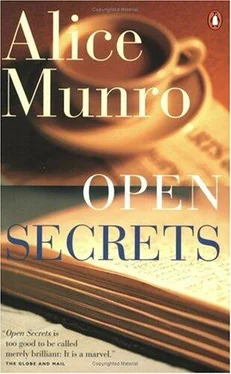The ambulance comes quickly, with its harrowing pulsing cry, and the ambulance men with the stretcher cart are soon in the room, the manager stumping after them, saying, “… couldn’t be moved. Here is Mrs. Massie came down to help in the emergency.”
While they are getting the old man onto the stretcher, Gail has to pull her hand away, and he begins to complain, or she thinks he does — that steady involuntary-sounding noise he is making acquires an extra ah-unh-anh . So she takes his hand again as soon as she can, and trots beside him as he is wheeled out. He has such a grip on her that she feels as if he is pulling her along.
“He was the owner of the Jacaranda Hotel,” the manager says. “Years ago. He was.”
A few people are in the street, but nobody stops, nobody wants to be caught gawking. They want to see, they don’t want to see.
“Shall I ride with him?” Gail says. “He doesn’t seem to want to let go of me.”
“It’s up to you,” one of the ambulance men says, and she climbs in. (She is dragged in, really, by that clutching hand.) The ambulance man puts down a little seat for her, the doors are closed, the siren starts as they pull away.
Through the window in the back door then she sees Will. He is about a block away from the Miramar and walking towards it. He is wearing a light-colored short-sleeved jacket and matching pants — probably a safari suit — and his hair has grown whiter or been bleached by the sun, but she knows him at once, she will always know him, and will always have to call out to him when she sees him, as she does now, even trying to jump up from the seat, trying to pull her hand out of the old man’s grasp.
“It’s Will,” she says to the ambulance man. “Oh, I’m sorry. It’s my husband.”
“Well, he better not see you jumping out of a speeding ambulance,” the man says. Then he says, “Oh-oh. What’s happened here?” For the next minute or so he pays professional attention to the old man. Soon he straightens up and says, “Gone.”
“He’s still holding on to me,” says Gail. But she realizes as she says this that it isn’t true. A moment ago he was holding on — with great force, it seemed, enough force to hold her back, when she would have sprung towards Will. Now it is she who is hanging on to him. His fingers are still warm.
When she gets back from the hospital, she finds the note that she is expecting.
Gail. I know it’s you .
Hurry. Hurry. Her rent is paid. She must leave a note for the manager. She must take the money out of the bank, get herself to the airport, find a flight. Her clothes can stay behind — her humble pale-print dresses, her floppy hat. The last library book can remain on the table under the sagebrush picture. It can remain there, accumulating fines.
Otherwise, what will happen?
What she has surely wanted. What she is suddenly, as surely, driven to escape.
Gail, I know you’re in there! I know you’re there on the other side of the door .
Gail! Galya!
Talk to me, Gail. Answer me. I know you’re there .
I can hear you. I can hear your heart beating through the keyhole and your stomach rumbling and your brain jumping up and down .
I can smell you through the keyhole. You. Gail .
Words most wished for can change. Something can happen to them, while you are waiting. Love — need — forgive. Love — need — forever . The sound of such words can become a din, a battering, a sound of hammers in the street. And all you can do is run away, so as not to honor them out of habit.
In the airport shop she sees a number of little boxes, made by Australian aborigines. They are round, and light as pennies. She picks out one that has a pattern of yellow dots, irregularly spaced on a dark-red ground. Against this is a swollen black figure — a turtle, maybe, with short splayed legs. Helpless on its back.
Gail is thinking, A present for Cleata. As if her whole time here had been a dream, something she could discard, going back to a chosen point, a beginning.
Not for Cleata. A present for Will?
A present for Will, then. Send it now? No, take it back to Canada, all the way back, send it from there.
The yellow dots flung out in that way remind Gail of something she saw last fall. She and Will saw it. They went for a walk on a sunny afternoon. They walked from their house by the river up the wooded bank, and there they came on a display that they had heard about but never seen before.
Hundreds, maybe thousands, of butterflies were hanging in the trees, resting before their long flight down the shore of Lake Huron and across Lake Erie, then on south to Mexico. They hung there like metal leaves, beaten gold — like flakes of gold tossed up and caught in the branches.
“Like the shower of gold in the Bible,” Gail said.
Will told her that she was confusing Jove and Jehovah.
On that day, Cleata had already begun to die and Will had already met Sandy. This dream had already begun — Gail’s journey and her deceits, then the words she imagined — believed — that she heard shouted through the door.
Love — forgive
Love — forget
Love — forever
Hammers in the street.
What could you put in a box like that before you wrapped it up and sent it far away? A bead, a feather, a potent pill? Or a note, folded up tight, to about the size of a spitball.
Now it’s up to you to follow me .
I
Miss Margaret Cresswell, Matron, House of Industry, Toronto, to Mr. Simon Herron, North Huron, January 15, 1852.
Since your letter is accompanied by an endorsement from your minister, I am happy to reply. Requests of your sort are made to us frequently, but unless we have such an endorsement we cannot trust that they are made in good faith.
We do not have any girl at the Home who is of marriageable age, since we send our girls out to make a living usually around the age of fourteen or fifteen, but we do keep track of them for some years or usually until they are married. In cases such as yours we sometimes recommend one of these girls and will arrange a meeting, and then of course it is up to the two parties involved to see if they are suited.
There are two girls eighteen years of age that we are still in touch with. Both are apprenticed to a milliner and are good seamstresses, but a marriage to a likely man would probably be preferred to a lifetime of such work. Further than that cannot be said, it must be left to the girl herself and of course to your liking for her, or the opposite.
The two girls are a Miss Sadie Johnstone and a Miss Annie McKillop. Both were born legitimately of Christian parents and were placed in the Home due to parental deaths. Drunkenness or immorality was not a factor. In Miss Johnstone’s case there is however the factor of consumption, and though she is the prettier of the two and a plump rosy girl, I feel I must warn you that perhaps she is not suited to the hard work of a life in the bush. The other girl, Miss McKillop, is of a more durable constitution though of leaner frame and not so good a complexion. She has a waywardness about one eye but it does not interfere with her vision and her sewing is excellent. The darkness of her eyes and hair and brown tinge of her skin is no indication of mixed blood, as both parents were from Fife. She is a hardy girl and I think would be suited to such a life as you can offer, being also free from the silly timidness we often see in girls of her age. I will speak to her and acquaint her with the idea and will await your letter as to when you propose to meet her.
II
Carstairs Argus , Fiftieth Anniversary Edition, February 3, 1907. Recollections of Mr. George Herron.
Читать дальше












